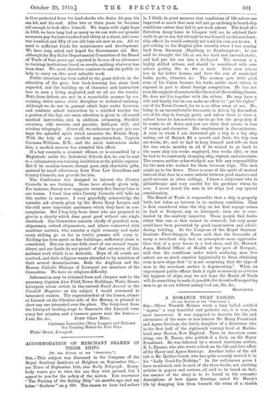ACCOMMODATION OF MERCHANT SEAMEN IN THEIR SHIPS.
[To THE EDITOR OF THE " SPECTATOR."] Stn,—This subject was discussed in the Congress of the Royal Sanitary Institute at Brighton on September 9th,— see Times of September 10th, also Daily Telegraph. Every- body wants you to whet the axe they wish ground, but I appeal to you for the safety of the nation. You remember " The Passing of the Sailing Ship" six months ago, and my letter " Seafarer "on p. 880. The reason we have bad sailors is, I think, in great measure that conditions of life ashore are improved so much that men will not go on living in board-ship conditions unless they fail to get work ashore. The head of a. Salvation Army home in Glasgow told me he advised their waifs to go to sea, but (though he was himself an old merchant- ship officer) he would certainly not send his own son to sea. I got talking to the English pilot recently when I was coming back from Germany (Hamburg to Southampton); he too said he thought the life at sea too hard and uncomfortable, and had put his son into a dockyard. The seaman is a highly skilled artisan, and should be considered with men ashore getting 30s. to 40s. a week. Such men ashore live in far better houses, and have the run of municipal baths, parks, libraries, &c. The seaman gets little good even of his Union because his trade, unlike most others, is exposed in part to direct foreign competition. He has not even the support of numbers like the rest of the working classes. He does not live together with the others. He may have a wife and family, but be can make no effort to "get his rights" out of his Town Council, for he is so often away at sea. He, being in an uncomfortable forecastle, is driven by discomfort out of his ship in foreign ports, and unless there is there a sailors' home he has nowhere else to go but the grog-shop if he wants to sit down, and you see what that means in loss of money and character. His employment is discontinuous. A man in whom I am interested got a trip in a big ship sailing out of Bristol, 24 a month and food; the trip was six weeks, £6; and he had to keep himself and wife on that for two whole months in all if he wished to go back to the same ship (six weeks employed, two weeks idle), or else he had to be constantly changing ship, captain, and associates. The owners neither acknowledged nor felt any responsibility for the men who worked for them between trips. The men might go to the deuce. There is none of the spirit of mutual interest that does in a sense subsist between good masters and good servants in other callings. I know a shipowner who is philanthropic and very careful for his gardener whom he sees. I never heard the men in his ships had any special consideration.
The Board of Trade is responsible that a ship is properly built, but takes no interest in its sanitary condition. That is first considered when the ship on her first voyage comes to load at Newport, say, or Liverpool; then she is over- hauled by the sanitary inspector. Those people find faults either that can or that cannot be removed ; but very many could have been prevented by good examination and advice during building. At the Congress of the Royal Sanitary Institute Fleet-Surgeon Home said that the forecastle of many a merchant ship had an atmosphere more oppressive than that of a poor house in a bad slum, and Dr. Howard Jones, Medical Officer of Health of the port of Newport, said that the conditions under which seafaring men live ashore are so much superior hygienically to those obtaining even in new ships that " it is not surprising that the type of men in the merchant service is degenerating." When an experienced public official finds it right so severely to criticise the hygiene of ships, may we not hope the Board of Trade will do something to make it possible for decent self-respecting men to go to sea without misery P—I am, Sir, &c., SEAFARER,














































 Previous page
Previous page